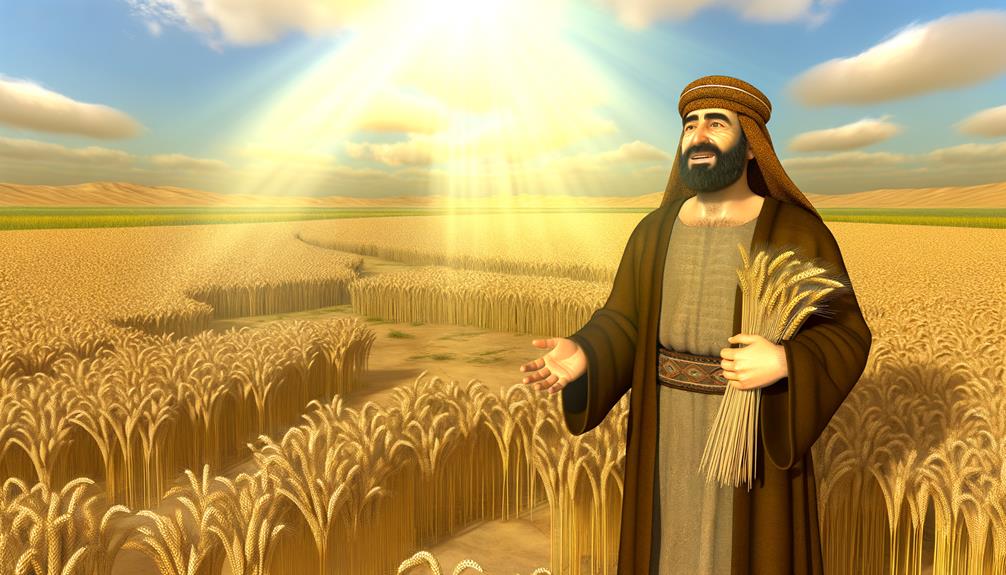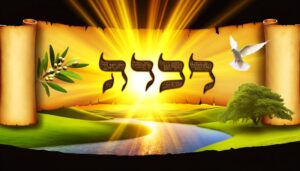Biblical Meaning of the Name Boaz
The name Boaz, derived from ancient Hebrew etymology, means 'strength' or 'swiftness.' In the Book of Ruth, Boaz emerges as a central figure epitomizing covenant loyalty and divine providence. As a prominent landowner in Bethlehem, his role as a kinsman-redeemer highlights his integrity and adherence to social responsibility.
Boaz marries Ruth, ensuring the continuity of Elimelech's lineage and becoming an ancestor to King David and ultimately Jesus Christ. Theologically, Boaz's actions foreshadow Christ's redemptive work and embody God's covenant faithfulness and inclusivity, urging deeper exploration into these profound biblical narratives.

Key Takeaways
- Boaz means 'strength' or 'swiftness,' reflecting qualities of robustness and agility.
- He is a central figure in the Book of Ruth, embodying covenant loyalty and divine providence.
- Boaz exemplifies integrity, righteous conduct, and compassionate leadership, especially in his treatment of Ruth.
- He plays a crucial role in biblical lineage, being an ancestor to King David and Jesus Christ.
- Boaz's actions prefigure Christ's redemptive work, highlighting God's covenant faithfulness and inclusivity.
Etymology of Boaz
The name Boaz, rooted in ancient Hebrew etymology, is traditionally understood to mean 'strength' or 'swiftness.' This etymological interpretation is derived from the Hebrew root 'בעז' (Baʿaz), signifying qualities of robustness and agility.
In historical context, names held profound significance, often reflecting the character or destiny of individuals. Scriptural analysis reveals that Boaz's name embodies his role and attributes within biblical narratives.
Theologically, Boaz's name represents divine empowerment, alluding to strength granted by God to fulfill His purposes. This nomenclature aligns with the broader biblical motif of names as indicative of divine virtues or missions.
The name Boaz encapsulates both the intrinsic qualities of the individual and the overarching theological themes within scripture.
Boaz in the Book of Ruth
In the Book of Ruth, Boaz emerges as a central figure whose actions and character reflect the ideals of covenant loyalty and divine providence. As a prominent landowner in Bethlehem, Boaz plays a vital role in the narrative of Ruth and Naomi.
His encounter with Ruth, a Moabite widow, highlights the themes of inclusion and divine orchestration within the Israelite community. Scriptural analysis reveals Boaz as a 'kinsman-redeemer,' a role grounded in Leviticus 25:25, which underscores his duty to support relatives in distress.
Theologically, Boaz's willingness to marry Ruth signifies God's provision and faithfulness, foreshadowing the Messianic lineage through David. His actions embody the Hebraic principles of hesed—steadfast love and kindness.
Boaz's Character and Values
Boaz's character, distinguished by his unwavering integrity and profound sense of justice, serves as a paradigm of Hebraic values deeply rooted in scriptural tradition. The Book of Ruth illustrates Boaz as a man who embodies righteous conduct and compassionate leadership. His actions reflect a commitment to the law and a deep sense of social responsibility, particularly in his treatment of Ruth and Naomi.
Boaz epitomizes virtues that are central to biblical teaching.
- Kindness and loyalty: Boaz extends generosity and protection to Ruth, a foreigner.
- Justice and fairness: He ensures Ruth's right to glean and safeguards her dignity.
- Faithful stewardship: Boaz manages his resources with prudence and respect for divine law.
- Commitment to community: He acts decisively to preserve family lineage and property rights.
Boaz's Role in Biblical Lineage
Building upon his exemplary character and values, Boaz's integral role in biblical lineage is profoundly significant, positioning him as a key figure in the ancestral line leading to King David and, ultimately, to Jesus Christ.
In the Book of Ruth, Boaz emerges as the kinsman-redeemer, marrying Ruth, the Moabite widow, thereby preserving the lineage of Elimelech. This union is blessed with a son, Obed, who becomes the grandfather of King David (Ruth 4:17).
Scriptural genealogies, such as those in the Gospels of Matthew (1:5-6) and Luke (3:32), highlight Boaz's critical place in the messianic line. His role underscores the divine orchestration within biblical history, showcasing the inclusive and redemptive nature of God's plan.
Theological Significance of Boaz
Through the lens of theological interpretation, Boaz's actions as a kinsman-redeemer not only secure the continuation of Naomi's family line but also prefigure the redemptive work of Christ. Boaz's adherence to Levirate law and his compassionate treatment of Ruth highlight key theological themes:
- Redemption: Boaz's role as a redeemer parallels Christ's redemption of humanity.
- Covenant Faithfulness: His actions reflect God's unwavering faithfulness to His covenant promises.
- Inclusivity: Boaz's acceptance of Ruth, a Moabite, underscores the universality of God's grace.
- Provision and Protection: His provision for Ruth and Naomi illustrates divine care and protection.
In Boaz, we see a foreshadowing of Christ as the ultimate redeemer, embodying God's salvific plan.
Conclusion
To sum up, the name Boaz, rooted in Hebrew etymology, appears prominently in the Book of Ruth, exemplifying values such as kindness, integrity, and faithfulness. The character of Boaz is described as a man of great wealth and status, yet he is also portrayed as humble and compassionate, especially towards Ruth, a young Moabite widow. This depiction of Boaz reflects the biblical significance of Yvonne, which emphasizes the importance of treating others with kindness and generosity. Throughout the Book of Ruth, Boaz acts as a model of righteousness and faith, embodying the core values of Hebrew tradition and serving as an inspiration for future generations.
Boaz's inclusion in the genealogy of David and Jesus underscores his theological significance.
Of special mention, Boaz is mentioned 24 times in the Book of Ruth, highlighting his pivotal role.
This frequency emphasizes the importance of his character and actions within the biblical narrative, providing a rich subject for historical and theological analysis.






